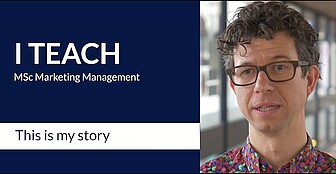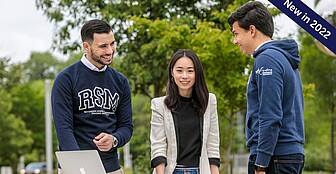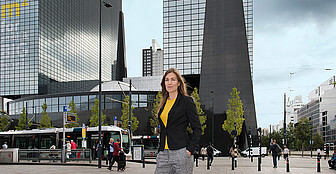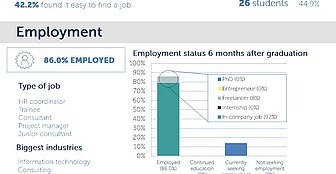
This website uses functional cookies, including analytical cookies. The obtained statistical data cannot be traced back to individual users. Additionally, you can choose to accept or refuse consent to use marketing cookies. If you decline these additional cookies or refrain from making a choice, only functional cookies will be set. See our cookie policy for more information.
Article: Monday, 26 February 2024
Amidst rising scepticism about the impact of sustainable investing, new research from Rotterdam School of Management, Erasmus University (RSM) shows that traditional strategies for influencing companies like shareholder engagement and portfolio screening, are not exhaustive. The researchers explain the under-recognised strategy for influencing companies in a short video below. Researchers were Associate Professor Dr Emilio Marti and PhD candidate Martin Fuchs of RSM, and Dr Mark DesJardine of Penn State University, Dr Rieneke Slager of Rijkuniversiteit Groningen, and Prof. Jean-Pascal Gond of Bayes Business School, City, University of London.
The researchers have created this video
to help explain the concept. The text
continues under the video.

This video cannot be loaded, as you have not accepted cookies.
Click here
to watch this video directly at the source.
By screening over 3,500 research papers, the researchers identified an under-recognised strategy for influencing companies, which they call ‘field building’. Field building means that investors influence the fields in which companies operate, thereby exerting influence on companies indirectly via other stakeholders or by changing aspect of the field.
The researchers identify five tactics for field building:
Each of the five tactics can change the fields in which companies operate, thereby creating additional pressure for companies to become more sustainable.
“Each of the five tactics can change the fields in which companies operate, thereby creating additional pressure for companies to become more sustainable. Despite these opportunities for increasing their impact, two reasons may deter investors from venturing into field building,” said Dr Marti.
“One reason is profitability. It can be difficult to make a business case for field building over the short term. Field building mostly generates costs for an investor, while benefits will be captured by other investors, including those in the future. Yet, given that many individuals are willing to accept lower returns if their investments create greater impact, they may seek out asset managers that engage in field building even if higher management fees slightly lower their returns."
“Another reason that investors might be deterred is political exposure. Field building requires that asset managers publicly take a stance on sustainability issues, which could lead to a backlash from people with different views – a risk that is higher among asset managers that cater to a wide range of customers. These asset managers can limit this risk by doing field building on sustainability issues for which a broad consensus exists among their customers, and those that are backed by a strong business case,” says Emilio Marti.
By broadening their toolbox of tactics and mastering field building, investors can better position themselves to have a more positive impact on the environment and society — and, in doing so, attract more individual investors that care about impact.

Emilio Marti is an associate professor at the Rotterdam School of Management. He is an organizational theorists with a keen interest in questions of corporate sustainability. Emilio is particularly interested in sustainable investing, and the question of how sustainable investing affects corporate sustainability. Emilio joined RSM in 2018 after post-doctoral positions at the Saïd Business School, University of Oxford, and Bayes Business School, City, University of London. He completed his PhD at the University of Zurich in 2015. His work has been published in journals such as the Academy of Management Journal, Academy of Management Review, Journal of Management Studies, and Organization Science.

Martin Fuchs is a PhD Candidate in the Department of Business-Society Management. He obtained his MSc in Global Business & Sustainability at the Rotterdam School of Management (2019) and holds a BSc in Organization Studies (2018) from Tilburg University. As a management scholar with an interest in sustainable finance, Martin focuses on the topics of shareholder engagement and the impact of sustainable finance in his research. In particular, he explores collaborations between investors through an organizational lens.
The research has been published in an open access article in the Journal of Management Studies. The authors have also written a Harvard Business Review article that summarises the five field building tactics.

We conduct a multidisciplinary review of how sustainable investing impacts the environment and society. Our review starts from the insight that shareholders can create impact not only through (1) portfolio screening and (2) shareholder engagement (two impact strategies most used by mainstream shareholders) but also through (3) field building (an impact strategy most used by shareholders at the periphery of the financial sector). Based on this framework of three impact strategies, we integrate insights from four disciplines (management, finance, sociology, and ethics/sustainability) to reconstruct how each impact strategy influences corporate sustain-ability. We identify 15 impact mechanisms through which the impact strategies produce three types of impact: portfolio screening and shareholder engagement mostly create direct impact on companies, while field building creates indirect impact via other shareholders and indirect impact via the institutional context. Our review suggests that shareholder impact emerges gradually as different types of shareholders build on each other’s efforts, which we use to outline a research agenda on shareholder impact as a distributed process.



















Science Communication and Media Officer

Corporate Communications & PR Manager
Rotterdam School of Management, Erasmus University (RSM) is one of Europe’s top-ranked business schools. RSM provides ground-breaking research and education furthering excellence in all aspects of management and is based in the international port city of Rotterdam – a vital nexus of business, logistics and trade. RSM’s primary focus is on developing business leaders with international careers who can become a force for positive change by carrying their innovative mindset into a sustainable future. Our first-class range of bachelor, master, MBA, PhD and executive programmes encourage them to become to become critical, creative, caring and collaborative thinkers and doers.
